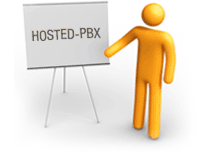A conventional PBX is located somewhere in the office and the company invested money in the hardware. A hosted PBX is not located in the company premises nor does the company invest money in the hardware. Instead, it is ‘hosted’ by a service provider much like the way Internet Service Providers host websites. When someone calls your number, the call does not connect directly to your office. It first goes to the service provider who, in turn, routes the call to the first available person in the department. The service provider uses the internet to route calls to relevant extensions in your office through an internet connection. The service provider invests in hardware and whatever software that is required for providing the service.
The concept of hosted PBX holds great promise for businesses that do not have the wherewithal to invest in a full-blown PBX. The installation cost alone can be quite staggering for start-ups and small and medium sized businesses. Hosted PBXs have capabilities such as voicemails, automated greetings, call records and routing calls to the relevant department. The system can also handle calls that are not immediately picked up at your office.
The bets p[art is that hosted PBX means that you do not have to worry about maintenance and replacing obsolete systems as you do not own the PBX.

No comments:
Post a Comment